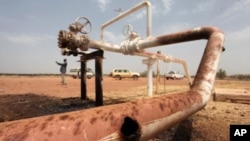Oil prices fell in recent days after soaring earlier this year. Worries about adequate oil supplies are outweighed by news that European voters have spoken out against austerity measures, some economies have fallen back into recession and key emerging nations are growing more slowly. But, high energy costs have already brought drastic changes in one global industry, and could still push it from profit back into loss.
Jet fuel prices were about one-seventh of the expenses for a typical airline a decade ago - consuming less of the budget than pay for pilots and other workers.
But International Air Transport Association spokesman Perry Flint says that has changed drastically and fuel costs now exceed salaries
"Today, jet fuel is the largest expense. On an industry-wide basis, we calculate that it represents about 34 percent of an airline’s operating expenses," Flint said.
Experts at the airline trade group say high fuel costs have already caused them to cut forecasts for the industry’s expected annual profit by $500 million to just $3 billion.
Profits could fall further if a political or military conflict causes crude oil prices to rise sharply and hit $150 a barrel. Flint says that could push the whole industry into significant losses.
So, what will happen to oil prices over the next few months?
"That is really difficult to know, and if I knew what it was going to do, I would be the wealthiest woman on the planet," said Rayola Dougher, a senior economic adviser for the American Petroleum Institute, which represents oil companies.
She says prices rose because of worries that unrest could hurt production in nations that export oil, cutting world supply.
“We are into a great deal of uncertainty moving forward especially with instability in the Middle East, we don’t know how that is going to play out. We don’t know what will happen with the sanctions with Iran,” Dougher said.
Recently, demand and prices are down because some major economies are growing more slowly or even shrinking.
Dougher says demand may be cut further as high U.S. gasoline prices prompt Americans to conserve fuel by getting smaller cars and driving less. She says these changes are likely to happen should U.S. prices go above $1.05 a liter and stay there.
The nationwide average price was within a few cents of that level just weeks ago, but has fallen recently.
She says lower oil prices can help economic growth, by freeing up money for business and consumers to spend, and driving up demand for goods and services.
Jet fuel prices were about one-seventh of the expenses for a typical airline a decade ago - consuming less of the budget than pay for pilots and other workers.
But International Air Transport Association spokesman Perry Flint says that has changed drastically and fuel costs now exceed salaries
"Today, jet fuel is the largest expense. On an industry-wide basis, we calculate that it represents about 34 percent of an airline’s operating expenses," Flint said.
Experts at the airline trade group say high fuel costs have already caused them to cut forecasts for the industry’s expected annual profit by $500 million to just $3 billion.
Profits could fall further if a political or military conflict causes crude oil prices to rise sharply and hit $150 a barrel. Flint says that could push the whole industry into significant losses.
So, what will happen to oil prices over the next few months?
"That is really difficult to know, and if I knew what it was going to do, I would be the wealthiest woman on the planet," said Rayola Dougher, a senior economic adviser for the American Petroleum Institute, which represents oil companies.
She says prices rose because of worries that unrest could hurt production in nations that export oil, cutting world supply.
“We are into a great deal of uncertainty moving forward especially with instability in the Middle East, we don’t know how that is going to play out. We don’t know what will happen with the sanctions with Iran,” Dougher said.
Recently, demand and prices are down because some major economies are growing more slowly or even shrinking.
Dougher says demand may be cut further as high U.S. gasoline prices prompt Americans to conserve fuel by getting smaller cars and driving less. She says these changes are likely to happen should U.S. prices go above $1.05 a liter and stay there.
The nationwide average price was within a few cents of that level just weeks ago, but has fallen recently.
She says lower oil prices can help economic growth, by freeing up money for business and consumers to spend, and driving up demand for goods and services.




